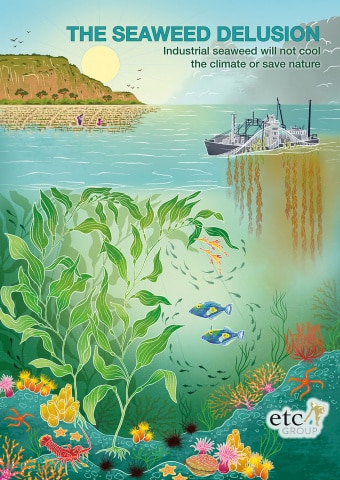The Seaweed Delusion: Industrial seaweed will not cool the climate or save nature

As the world scrambles for a climate fix, seaweeds – or “macroalgae” – have been thrust into the limelight. Buoyed up by hype and hundreds of millions of dollars of so called “green” investment, a new “blue carbon” seaweed industry is invading coasts and seas, ostensibly under the umbrella of the 2015 Paris Agreement on Climate Change.
By mid-2023 there were more than 1,300 companies involved in commercial seaweed, including more than 200 start-ups. Many of these start-ups are led by individuals from the software, finance, engineering and media industries with no prior experience in aquaculture, seaweed ecology, seaweed gathering or mariculture, who see new profit-making opportunities on the horizon.
Under close scrutiny, most of the arguments being used to promote these “blue carbon” seaweed projects – which include industrial-scale farming and sinking seaweed, through to “rewilding” and restoration projects – fail to stack up. For example, it has been found that seaweed ecosystems can be carbon sources rather than sinks – potentially causing up to 150 tonnes of CO2 emissions/km²/year.
Indigenous Peoples, traditional communities and fisherfolk reliant on coastal ecosystems would be severely impacted by industrial seaweed scaleup plans. One study suggests that to sequester just 0.2% of global CO2 emissions would require an ocean seaweed farm equivalent to a 100-meter-wide belt around 63% of the world’s coastline. This would be an unprecedented occupation of coastal territories, causing displacement and eroding vital food systems and livelihoods.
Read more in ETC Group’s new report.